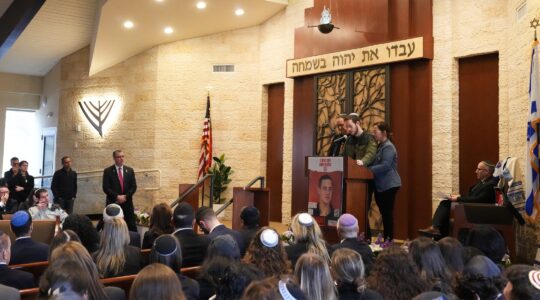JERUSALEM (JTA) — The Palestinian Authority said it would turn to the international community to fight a bill in Israel that would limit the volume of the muezzin’s call to prayer.
Known as the “muezzin bill,” the measure passed the Knesset’s Ministerial Committee for Legislation on Sunday and moves to the full Israeli parliament.
The call to prayer comes from a minaret of the mosque five times a day, including very early in the morning. In modern times, the mosques use loudspeakers to assist in making the call.
Israeli Prime Minister Benjamin Netanyahu threw his support behind the bill on Sunday at the weekly Cabinet meeting.
“Muslims, as well as Jews and Christians, also suffer from this,” Netanyahu said of noise from public address systems in houses of prayer in Israel. “I cannot count the times, they are simply too numerous, that citizens have turned to me from all parts of Israeli society, from all religions, with complaints about the noise and suffering caused them by the excessive noise coming to them from the public address systems of houses of prayer.”
Netanyahu added: “This is how it is in many European cities and in many places in the Islamic world, where the loudness of the announcements is limited out of consideration for the populace as a whole.”
Responding to the muzzein bill and a measure that would legalize some West Bank outposts, a spokesman for Palestinian Authority President Mahmoud Abbas told Palestinian media they “will drag the region into a catastrophe.”
Nabil Abu Rudeineh said the P.A. would turn to the United Nations Security Council and “all international organizations” to prevent the measures.
The chairman of the Joint Arab List Party, Ayman Odeh, called the muezzin bill “racist” and “populist.”
“Its whole goal is to create an atmosphere of hatred and incitement towards the Arab public,” Odeh said. “There are already noise laws that apply to mosques, and it is clear that the whole purpose of the bill is to label mosques as problematic.”
The Israel Democracy Institute said in an opinion submitted to the Knesset committee that “even though the bill is worded in neutral language and defines a house of worship as a ‘synagogue,’ ‘church’ or ‘mosque,’ it is clear that in practice this law is aimed at limiting and harming the activities of mosques only. After all, only Muslim houses of worship make frequent use of public address systems.”
JTA has documented Jewish history in real-time for over a century. Keep our journalism strong by joining us in supporting independent, award-winning reporting.





